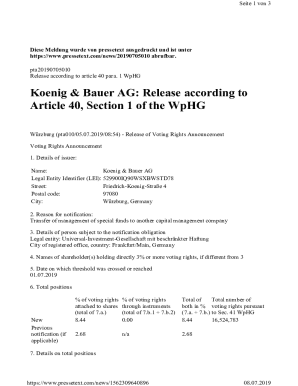European Central Bank Creates Task Force For Simpler Banking Regulations

Table of Contents
The Rationale Behind Simpler Banking Regulations
The current framework of EU banking regulations, while aiming for stability and consumer protection, has become increasingly complex. This complexity has several negative consequences:
-
High compliance costs stifle innovation and growth. Banks expend significant resources on meeting stringent regulatory requirements, diverting funds from investment in new technologies and services. This ultimately hinders growth and competitiveness. The cost of compliance disproportionately affects smaller banks, potentially leading to consolidation and reduced market diversity.
-
Overly complex rules hinder efficient lending to businesses and consumers. The intricate nature of regulations increases the time and cost associated with loan processing, making credit less accessible to businesses needing capital for expansion and to consumers seeking mortgages or loans. This can negatively impact economic activity.
-
Inconsistencies across member states create fragmentation. Differences in regulatory interpretations and implementation across the Eurozone lead to a fragmented market, increasing compliance difficulties for banks operating across multiple jurisdictions and potentially creating uneven playing fields.
-
Increased regulatory burden impacts smaller banks disproportionately. Smaller financial institutions often lack the resources to navigate complex regulations effectively, placing them at a competitive disadvantage compared to larger banks with dedicated compliance departments.
The ECB's overarching goal is to create a more streamlined and effective regulatory framework that maintains financial stability while promoting efficiency and growth. This requires a careful review and simplification of existing rules to foster a more dynamic and competitive European banking sector. The focus is on achieving effective regulation without unnecessary burdens.
The Composition and Mandate of the Task Force
The task force comprises representatives from various ECB departments, including banking supervision, legal, and economics. Members from national central banks across the Eurozone are also included, ensuring diverse perspectives and national context are considered. The possibility of including external experts with specialized knowledge in banking regulation and law is being explored.
-
Expertise in banking supervision, legal frameworks, and economic analysis. The task force draws upon a wide range of expertise to ensure a holistic approach to regulatory simplification.
-
Specific focus on identifying and eliminating unnecessary regulatory complexities. The mandate is not to weaken regulations, but to streamline them, removing redundancies and ambiguities while maintaining robust oversight.
-
Collaboration with other EU institutions and stakeholders. The task force will engage with other relevant European Union bodies, such as the European Banking Authority (EBA), and key stakeholders, including banks and consumer advocacy groups, to gather feedback and ensure a comprehensive and balanced approach.
The task force has a defined timeline, with its deliverables expected to include a comprehensive report, detailed recommendations for regulatory changes, and potentially proposed legislative amendments.
Potential Impacts of Simplified Regulations
The simplification of banking regulations holds the potential to significantly benefit the Eurozone's financial landscape:
-
Enhanced access to credit for businesses and consumers. Streamlined processes for loan applications will lead to quicker approvals and potentially lower interest rates, thereby improving access to credit for both businesses and consumers.
-
Lower operating costs for banks, leading to potentially lower interest rates. Reduced compliance costs will allow banks to allocate more resources to core business activities and potentially pass on the savings to customers through lower interest rates on loans and other financial products.
-
Increased investment in innovation and technological advancements. With reduced administrative burdens, banks can invest more in developing innovative financial products and services, fostering competition and improving customer experience.
-
Improved financial stability across the Eurozone. A more efficient and less complex regulatory environment can enhance the overall stability of the Eurozone banking system.
However, it is crucial to acknowledge potential challenges:
-
Potential loopholes. Simplification must be carefully balanced to avoid creating unintended loopholes that could be exploited, undermining the intended objectives. Thorough risk assessment is critical.
-
Unintended consequences. Changes to regulations could have unforeseen consequences that require swift adaptation and corrective measures. Ongoing monitoring and evaluation are vital.
Comparison with Other Jurisdictions' Approaches to Banking Regulation
The ECB's initiative aligns with global trends toward regulatory simplification. Other major economies, such as the United States and the United Kingdom, have also undertaken efforts to streamline their banking regulations. While specific approaches differ, the common goal is to reduce regulatory burdens without compromising financial stability.
-
Similarities and differences in approaches. Comparisons reveal that the strategies employed vary based on specific national contexts, the structure of the banking sector, and the regulatory priorities of each jurisdiction.
-
Lessons learned from other jurisdictions. Analysis of experiences in other countries can provide valuable insights and inform the ECB's approach, helping to avoid potential pitfalls and maximize the benefits of simplification.
-
Potential for international cooperation and harmonization of standards. Increased collaboration and harmonization of regulatory standards across different jurisdictions could further improve the efficiency and competitiveness of the global banking system.
Conclusion
The ECB's establishment of a task force focused on simpler banking regulations is a significant step toward a more efficient and competitive Eurozone banking sector. The potential benefits – increased lending, reduced costs, and enhanced financial stability – are substantial. However, a cautious and balanced approach is necessary to mitigate potential risks. Careful consideration of international best practices and robust monitoring will be essential for successful implementation.
Call to Action: Stay updated on the task force's progress and the implementation of simpler banking regulations. Follow the ECB's official announcements and relevant news sources to gain a comprehensive understanding of this evolving landscape and its impact on the European economy. Understanding the changes in banking regulation simplification is crucial for businesses and consumers alike.

Featured Posts
-
 Teslas Canadian Price Hike A Deep Dive Into Tslas Strategy
Apr 27, 2025
Teslas Canadian Price Hike A Deep Dive Into Tslas Strategy
Apr 27, 2025 -
 German Renewable Energy Expansion Pne Group Receives Permits For Wind And Solar Projects
Apr 27, 2025
German Renewable Energy Expansion Pne Group Receives Permits For Wind And Solar Projects
Apr 27, 2025 -
 Offenlegungspflicht Pne Ag Artikel 40 Absatz 1 Wp Hg
Apr 27, 2025
Offenlegungspflicht Pne Ag Artikel 40 Absatz 1 Wp Hg
Apr 27, 2025 -
 Grand National Horse Deaths A Look At The Statistics Before 2025
Apr 27, 2025
Grand National Horse Deaths A Look At The Statistics Before 2025
Apr 27, 2025 -
 Dubai Wta 1000 Caida De Paolini Y Pegula
Apr 27, 2025
Dubai Wta 1000 Caida De Paolini Y Pegula
Apr 27, 2025
